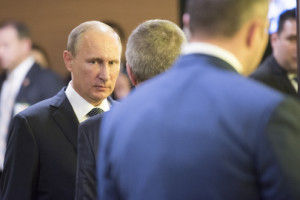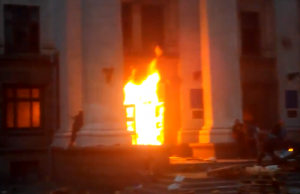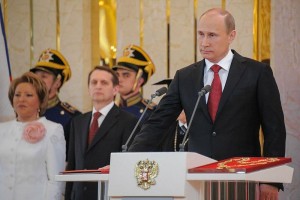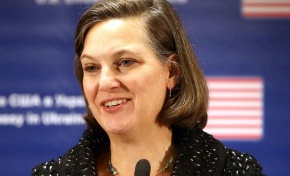
Gilbert Doctorow, Ph.D.
Gilbert Doctorow is the European Coordinator of the American Committee for East West Accord, Ltd. Gilbert Doctorow is a Research Fellow of the American University in Moscow
The West’s scary new catch phrase for anything the diabolical Russians do is "hybrid war,” accusing Moscow of spreading propaganda and funding NGOs, pretty much what the West has been doing for decades, as Gilbert Doctorow explains.
The momentum into a new Cold War – and possibly toward World War III – is growing stronger, a process in Europe that has the look of a brain-dead continent sleepwalking toward the abyss, unwilling or unable to resist the accumulation of harsh propaganda against Russia.
Indeed, the new buzz word in the West — directed against anyone who challenges whatever extreme charge is made against Moscow — is that you’re part of Russia’s "hybrid war” against the West. In other words, silencing these few voices of dissent is portrayed as a defensive measure against "Russian aggression.”

Russian President Vladimir Putin, following his address to the UN General Assembly on Sept. 28, 2015. (UN Photo)
Of course, this intimidation of those speaking up against a new Cold War is reminiscent of the old Cold War when people who urged peaceful coexistence were smeared as communist stooges. Now, you can expect to be dismissed as a fifth columnist serving your Kremlin masters as they wage "hybrid war,” a vague concept that suggests that criticizing the West’s policies is just one element of a hostile strategy hatched in Moscow.
A microcosm of this benighted attitude could be seen in an otherwise humdrum conference last week before the European Parliament, which aside from its quasi-legislative functions is host to numerous informational events in its conference rooms and auditoriums.
The organizer of the event was Anna Fotyga, a European parliamentarian (or MEP) from Poland who has had a very high profile in that country’s domestic politics within what is now the ruling party in Warsaw, the right-wing Law and Justice party (PiS in Polish). During 2006-2007, she was the Minister of Foreign Affairs in the first government of the Kaczynski brothers, PiS’ founders.
The foreign policy of PiS both then and today is marked by Euroskepticism and hostile rhetoric directed against Poland’s big neighbors, Germany and Russia, although today the emphasis is one of Russophobia and a full-scale resurrection of a Cold War in which Poland plays a unique role as America’s advance military post and bastion against Russia.
For Fotyga, serving in the European Parliament (EP), is by no means a political exile, as is often assumed to be the case when speaking about high-flying politicians who are sent to Brussels. On the contrary, the EP has provided her with an excellent platform to continue on a pan-European scale the policies she worked on from Warsaw.
Fotyga has been a leading member of the group of 75 MEPs from Poland and the Baltic States, accounting for just 10 percent of the parliamentary seats, who have been the driving force behind a succession of virulently anti-Russian resolutions that were approved with ever greater frequency by the European Parliament in the past couple of years.
Demonizing Russia
From her words last week, it was clear that she is now working on a new effort to pass a law through the EP that requires European non-governmental organizations (or NGOs) receiving funding from abroad to report the details to the authorities. It was not clear, however, whether the application would be universal or just concern funding coming from Russia, though the context of the meeting suggests such selective application is likely what is intended.
Surely it would not be in the interests of the sponsors of the bill to publicize the extent to which European civil society is being funded and directed by proxies of the U.S. government.
As Fotyga told us, the model for such a law is the U.S. Foreign Agents Registration Act, which served also as the model for the Kremlin a couple of years ago when it introduced such a requirement amid concerns that U.S.-funded operations such as the National Endowment for Democracy might try to initiate a "color revolution” in Moscow, similar to what has occurred in other ex-Soviet states and other countries on Washington’s "regime change” list.
At the time, Moscow was denounced in Europe and the U.S. for this measure, which was alleged to be part of a crackdown on civil society, i.e., forcing NGOs operating in Russia to acknowledge their foreign backers and exposing them to ridicule from patriots or be shut down for failing to file. [See Consortiumnews.com’s "Why Russia Shut Down NED Fronts.”]

Screen shot of the fatal fire in Odessa, Ukraine, on May 2, 2014, which killed several dozen ethnic Russians opposing the post-coup regime in Kiev. (From RT video)
The report, presented at the conference last week, was directed against the agents of Russian "soft power,” and in particular, the Kremlin-funded NGO "Russkiy Mir” (The Russian World) which serves the Russian diaspora abroad. Such a report was a useful exhibit for Fotyga in her proposed new anti-Russian campaign.
The author and presenter of the report was Orysia Lutsevych, a Ukrainian national based in London, where she works as manager of the Ukraine Forum in the Russia and Eurasia Programme of the British think tank Chatham House, which was the publisher of her report.
Though Chatham House has had a long and distinguished history, today it is not the salon of aristocrats and intellectuals as it was perhaps once upon a time. A large majority of its experts on Russia and the former Soviet Union are clearly aligned with the Liberals who had the run of Russia in the 1990s under President Boris Yeltsin when insiders expropriated much of the country’s wealth, creating a small caste of billionaires and a wide chasm of Russians falling into poverty. These Chatham experts are fiercely critical of Vladimir Putin’s Russia today.
Secondly, Lutsevych’s résumé as posted on the Chatham House website set off alarm bells for anyone expecting unbiased academic research on Russia. Her Masters degree in international relations was taken at Lviv State University, in the heartland of the Maidan movement of radical Ukrainian nationalism.
Her second MS is said to have been in "public administration” from the University of Missouri-Columbia, which boasts about its skills at public relations, saying "Students come to us with the desire to change the world.[bold type theirs]. We give them the practical knowledge and skills to make a difference for people, organizations and communities.” That sounds a lot like an advanced degree in propaganda and organizing "color revolutions.”
Her employment record backs up this interpretation of her skills. Her professional career began in 2005-07 as Deputy Director of the PAUCI Foundation, an acronym for the Polish Ukrainian Cooperation Foundation. From there she moved to the position of Executive Director of the newly founded Open Ukraine Foundation of Arseniy Yatsenyuk (the same "Yats” whom U.S. Assistant Secretary of State Victoria Nuland promoted in 2014 to be the premier of post-coup d’état Ukraine).
In 2009, Lutsevych served as Head of Development at Europe House Georgia. And in 2012 she finally found her niche in the West, becoming a fellow of the Russia and Eurasia Programme, Chatham House, where we find her today.
Seeing Russian ‘Agents’
Given where Lutsevych is coming from, her report entitled "Agents of the Russian World. Proxy Groups in the Contested Neighbourhood” is rather bland and seemingly inoffensive. Russia’s perspective on relations with the West as a defense against ever increasing encroachments is set out with reasonable accuracy.

Russian President Vladimir Putin taking the presidential oath at his third inauguration ceremony on May 7, 2012. (Russian government photo)
The problem is the very British logic of "you would say that, wouldn’t you,” meaning that Russian perceptions remain just that – perceptions – which implicitly, by default, do not correspond to reality, though that assumption is never tested or proven.
Yet, the record shows unequivocally that the Kremlin’s foreign policy follows one principle only, Realism, meaning defense of national strategic interests, and is not subject to Romantic nationalist visions of any kind. But the author repeats the convenient deception that Russian policy is guided by the obscurantist philosophy of former Moscow State professor Alexander Dugin, currently in official disgrace, with his Eurasianism and antipathy to the values of the West. Imperial ambitions are attributed to "the current Russian leadership” without the slightest attempt to provide proof.
If we cut to the quick, what is missing in this report is any attempt to place Russian state policies, supposedly aimed at developing soft power abroad, in an historical or geographical context. Historical analysis, with play-by-play recounting of who did what to whom, would make it plain that Russia built NGOs to further its language, culture and political interests abroad as a delayed response to the realities of the breakup of the Soviet Union in 1992.
Because of that collapse, Russian speakers and/or ethnic Russians overnight became the world’s single largest national group living outside the political borders of its own ethnos. They became subject to treatment as second-class citizens or, as in the case of the Baltic States, to revocation of civil rights. They numbered perhaps 25 million, though estimates range as high as 40 million.
The delay in official Russian state response to this reality may be explained by Russia’s own self-absorption with its severe economic problems in the turbulent 1990s when the great mass of the population fell below the poverty line. The emergence of Russia from its "time of troubles” early in the new millennium under President Putin made it possible finally to deal with the sad fate of Russia’s former compatriots living abroad.
And it has done so in the most circumspect way, especially when compared to the currently fashionable principle in Western international relations asserting a "responsibility to protect” threatened minorities. "R2P” apparently justifies military interventions in countries governed by U.S. adversaries, such as Libya and Syria, but not in, say, Ukraine where the endangered civilians are ethnic Russians.
Russia’s ‘Soft Power’
The report’s author Lutsevych correctly indicated that nearly all of Russia’s ‘’soft power” investments in supporting its language, culture and identity abroad is invested in former Soviet Union space, especially Ukraine and Kazakhstan, which happen to be where the greatest number of ethnic Russians and Russian speakers — left adrift in 1992 — happen to live.
In fact, the only area where Russian support for compatriots through state-financed NGOs has relevance to the European Union is the Baltic States of Latvia, Estonia and Lithuania. There this issue is conflated by Russia’s detractors in the European Parliament with the very emotive notion of "hybrid warfare” that Russia is said to have waged in its takeover of Crimea in March 2014 and in the Donbass conflict in eastern Ukraine (where ethnic Russians were under threat of violent attack).
It is also symptomatic of the entire anti-Russian narrative to ignore similar NGO activities by the United States, the United Kingdom, France, Germany and even Spain through a great variety of platforms that they have established around the world, with an emphasis on former colonies or territories of historical interest.
Put in this context, the Russian efforts are exceedingly modest and would never justify the attention that they are receiving from Moscow’s detractors. But the broader lesson is that the authors of such reports never look in the mirror and ask what they themselves are doing. Everything Russia is doing is taken to be unique, calculating and sinister whereas the West’s actions set a gold standard for selflessness, generosity and good governance.
In this same connection, it is more than ironic that the Acknowledgements page of the report thanks the German Marshall Fund of the United States and the Robert Bosch Stiftung for financing that made its publication possible. Both entities fit perfectly Lutsevych’s remarks on how state-funded agents and loyal business interests fund modern state propaganda, a system that the United States and the West, in general, have pioneered. [See Consortiumnews.com’s "The Victory of Perception Management.”]
At the seminar, we were told by Lutsevych that she would not go over the entire thesis of the research because her 43-page brochure-report was handed out to all attendees. And so we were treated to what she considered highlights and to a free exchange with the audience.
This, in fact, is what justifies going to such events, because when away from their editors and handlers, the rapporteurs and politician-hosts can give free expression to their fantasies and share some memorable and very telling indications of what they really have in mind. Such was the case on May 31.
They do this in full confidence that the audience or participants are either meek underlings or colleagues who are like-minded to themselves. MEPs tend not to show up. Assistants and researchers will not pose hostile questions. And the general public has been screened in advance by the registration process.
Selecting the Audience
In this regard, possibly hostile members of the general public are weeded out in advance. I note that my request for registration by email in which I identified my institutional affiliation was rejected by Fotyga’s assistant on the morning of the event. Very likely she googled me before responding that the registration list was already closed.
And yet, when the session opened, perhaps 10 percent of the seats were vacant. So, I got in with the help of a kindly administrative assistant who works for an MEP with whom Fotyga is at odds. During the whole session, both Fotyga and Lutsevych stared pointedly at me much of the time, as if expecting some protest flag to be unfurled.
The highlight — and a good indication of the mental abilities of the author of the report — came at the end of Q&A when Lutsevych chose to explain the nature of Putin’s distortions of our Western political concepts that his agents supposedly are spreading in our midst.
According to Lutsevych’s account, democracy, as Putin understands it, is rule by majority and referendums whereas for the West democracy is protection of minorities, meaning proportional representation, etc. The context for Lutsevych’s thinking was surely the referendum in Crimea in which some 96 percent of the voters favored leaving Ukraine and rejoining Russia or possibly it was the recent Dutch referendum opposing ratification of the European Union-Ukraine association agreement.
There were very few questions from the audience and, in fact, the session broke up a half an hour early. But there was one question that deserves careful attention. It came in response to remarks by Lutsevych at the start of her presentation.
Lutsevych opened her talk citing an interview recently given by Svetlana Alekseevich, in which the Nobel prize-winning author from Belarus said that Russians want to live in a "great country” rather than a "normal country.” In Lutsevych’s estimation, Russia’s neo-imperial ambitions are behind its creation of a Russkiy Mir ideology and its seeking to obstruct the integration process of its shared neighborhood, namely Ukraine and Moldova, with the European Union. Hence, too, the strongly anti-American narrative which Russian proxy agents supposedly disseminate abroad in the information (or hybrid) war.
These words, which were among the very few observations which went off script from the report, elicited a "question” or, more properly speaking, a comment from the one MEP in attendance, Eugen Freund, an Austrian member of the Progressive Alliance of Socialists and Democrats, the center-left half of the coalition that effectively controls the European Parliament.
Freund remarked that he was initially uncertain which country with a known belief in its "exceptionalism” the speaker was talking about, the United States of America or Russia. Said Freund, there was nothing very unusual in Russia’s soft power agenda.
To this Lutsevych responded that while similarities may seem to exist, the content was utterly different. To be sure, America’s Freedom House and National Endowment for Democracy are both largely funded by the U.S. Treasury, but they have independent governing boards and congressional oversight by bipartisan committees, she said. Moreover, she added, their employees are genuinely dedicated to doing good works in a charitable spirit. To whom she was addressing these fairy tales from Cold War mythology is not at all clear.
Brain-dead and the Abyss
The conference also underscored another problematic element in the way European politicians tend to address the darkening storm clouds of a new Cold War. There is timidity about challenging the emerging "group think” that exaggerates the evils of Russia and ignores Moscow’s understandable worries and concerns.

Assistant Secretary of State for European and Eurasian Affairs Victoria Nuland during a press conference at the U.S. Embassy in Kiev, Ukraine, on Feb. 7, 2014. (U.S. State Department photo)
While individual countries in Europe have reputations for ingrained individualism and divergence of opinion, Europe as a whole has a reputation for consensus or going with the flow, even if the flow is heading over the cliff.
I have little doubt that MEP Freund’s views on the intellectual merit of the presentation and presenters on May 31 differed little from my own, but he contented himself with one critical remark rather than deconstructing the arguments as a whole.
And, there is the nub. Without open debate on the key issues of European security including relations with Russia, we all are losers. We, in the minority who are warning about the dangers and the mindlessness of a new Cold War, are busy shadow boxing because no one invites us into the ring. When we do speak out, our loyalty is questioned. We are accused of advancing Russia’s "hybrid war.”
And those in the ring, like Fotyga and Lutsevych, produce specious arguments in favor of the reckless policies pushing Europe toward an ill-considered and very expensive conflict, one that could veer out of control into a hot war, even a nuclear war. This is what I mean when I describe a brain-dead continent sleepwalking toward the abyss.




_jpg/250px-ElbeDay1945_(NARA_ww2-121).jpg)





